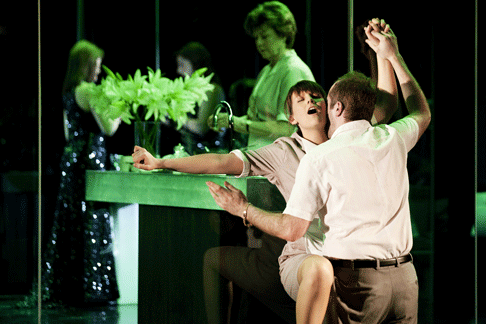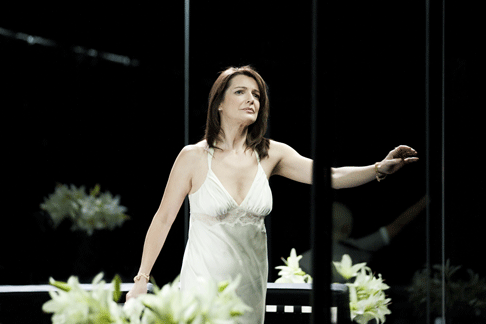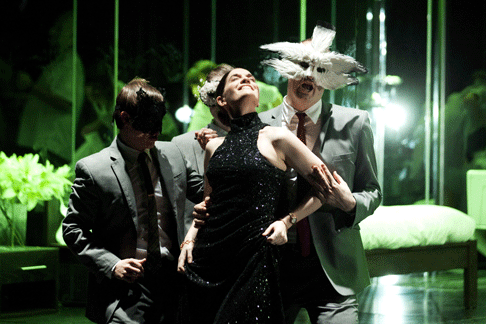Mythic and epic tales often seem designed to offer a veiled explanation of
an essential truth, as they attempt to use the lessons of the past to make
sense of a difficult present. The plot of Il ritorno d’Ulisse is
drawn from Homer, filtered through Virgil, and Monteverdi’s musical
retelling certainly invokes the power of myth. But, as Penelope awaits the
return of her long-lost husband, Ulisse, from the Trojan Wars, the concerns and
emotional dramas seem much more human than divine.
Indeed, Andrews’ production commences with a shocking parade of
‘Human Frailty’, crudely masked and brutality dragged, like a dog
or abused prisoner of war, onto the stage by his cruel masters, Time, Love and
Fortune. The message is clear: man is pitifully frail, a mere plaything of the
gods. And, man’s infinite suffering at the hands of indifferent deities
is unambiguously portrayed in the unfolding drama. The anguish and frustration
of the protagonists is unceasingly evident as we peer through the transparent
walls of designer Börkur Jónsson’s striking set, which continuously
revolves to allow for microscopic scrutiny of the characters’ agonies.
The monochrome set pitilessly exposes mankind’s defencelessness. Dusty
sheets roll back to reveal Penelope’s glass-sided, pseudo-loft space,
equipped with cocktail bar, cinema room and other requisites of modern luxury
living. But, beneath the civilised veneer lies a brutal reality. Smart-suited
suitors leer and lounge in louche fashion; Ulisse’s faithful old nurse,
Ericlea, serves up supper, only for her culinary efforts to be flung in fury at
the transparent walls; the television screen relentlessly relays brutal reports
from the battlegrounds of war. Penelope paces and prowls, tended by two
considerate and compassionate maids who try to shield her from the sexual
avariciousness of the lewd suitors.
Under harsh spotlights, the inhabitants clutch and grasp at the walls. The
pristine glass is soon stained and smeared with food and drink, and ultimately
splattered with human flesh and blood.
Nothing escapes the voyeuristic gaze. Just as we witness every private agony
and torment, so the inhabitants of the house stare inexorably at the action
which unfolds outside, as characters step through the glass door onto the front
of the stage. The sufferings within mirror those without, and this is enhanced
by some effective visual doubling: the Goddess Minerva, Ruby Hughes, is dressed
as Penelope’s double, emphasising her power as she controls and
manipulates her human puppets.
The ubiquitous psychological angst is also conveyed in the form of magnified
images which are projected onto two vast screens to left and right. However,
the singularity of emotional affekt and the unchanging nature of the
visual expressions quickly reduces the dramatic impact of these unremitting
close-ups of grief and distress; as the opera progresses, the contorted facial
gestures become a distraction.
Andrews’ direction is tireless in its attention to detail, if somewhat
tiring in its demands on the audience, who face quite a challenge to
comprehend, even observe, every nuance, motif and metaphor. However, the cast
are uniformly committed and intense, communicating Christopher Cowell’s
superb translation with vigour if not always with equal clarity of diction.
 Katherine Manley as Cupid and Thomas Walker as Eurimaco
Katherine Manley as Cupid and Thomas Walker as Eurimaco
Neither Tom Randle nor Pamela Helen Stephen are early-music
‘specialists’ but, as the divided lovers, Ulisse and Penelope, they
bring much dramatic insight and conviction to their respective roles.
Randle summons all his dramatic and musical resources, and powerfully
exploits his muscular physique, to convey the nature and degree of the
emotional suffering and transformation undergone by the conquering hero. A
ravaged war hero, broken by the ruthless events he has witnessed and the
vicious acts he has performed, driven to the very edge of sanity, Ulisse
wanders in the margins, cloaked like a wandering hobo, draped in shadows. A
pathetic victim, urinated upon by the social underclass, Randle wins our
unquestioning sympathy, his beautiful tenor possessing a slight grain which
keeps sentimentality at bay. Consequently, the Tarantino-esque savagery with
which he later despatches of his ‘rival’ suitors is appalling and
disturbing, following the fragile pathos of his return to his homeland. And,
the amorality of the senseless violence is further emphasised by the fact that
Ulisse’s blood-thirsty revenge is documented by a newsreel cameraman, his
focus steady and sure, untroubled by the horrors of the scene he is recording.
Randle retreats to the shower room in an attempt to wash away the blood and
gore, and to cleanse his emotional wounds, but it is clear that he returns to
his wife a damaged man, perhaps irrevocably so, and the reunion with his
long-suffering wife is tinged with wretchedness.
The lament of an abandoned woman was a standard topos in early
seventeenth-century opera, and while Pamela Helen Stephen does not have an
especially distinctive voice, she is perfect for the role of enduring but
dignified victim that Andrews envisages. She has a particularly affective lower
register, and as her voice descends it intertwines with emotional force with
the instrumental fabric. Stephen’s delivery of the recitative is flexible
and confident. Penelope’s ‘refusal’ to sing in an aria form
becomes a potent metaphor for her emotional state as she refuses to give way to
love; only when she recognises Ulisse can she express herself in song, and
Stephen’s rendering of Penelope’s aria, ‘Illustratevi, o
cieli’, is a powerful and climactic moment as her distress is transmuted
to joy.
 Pamela Helen Stephen as Penelope
Pamela Helen Stephen as Penelope
Ruby Hughes is a sensuous and assertive Minerva, domineering and somewhat
sinister — Ulisse meets the goddess in the form of a small, rather
unnerving, ventriloquist’s dummy. Hughes powerfully conveys the
Goddess’s pride and hauteur as she manipulates the ‘puppets’
in her control, before she too succumbs to emotional breakdown and collapse.
Here, Andrews parts company with the myth, for traditionally Minerva is
associated with culture and wisdom, rather than the lustful licentiousness of
Andrews’ conception. And while one might accept this re-imagining of
Minerva, dressed in a slinky, sequinned black gown, it’s harder still to
understand why she later smears herself with blood, and douses herself in white
talcum powder …
One of the finest performances of the evening comes from Thomas Hobbs, as
Ulisse’s son, Telemacho. Hobbs has a strong, focused tenor voice, but one
which is sufficiently flexible to convey emotions ranging from grief to
self-composure, hope to wonderment, and his reunion with Ulisse is immensely
moving.
Nigel Robson, as the shepherd Eumete, presents a touching portrayal of a
loyal servant. And, his interaction with Brian Galliford’s gluttonous,
parasitic Iro is superb. Living off the wealth of the suitors, Iro appears at
several points in Il ritorno as a figure of fun: he is mocked by
Eumete in Act I (but not without himself making some pointed comments on the
pastoral life) and is thrashed by Ulisse in Act II. However, his scene at the
beginning of Act III takes on a different edge, and Galliford’s voice
surpasses the comic to take on a tragic tone as Iro veers towards madness,
providing a significant focus for the opera as a whole.
The inclusion of scurrilous and comic characters is just one of the features
which were, by 1639, standard in Venetian public opera. Many were drawn from
the theatre — indeed, Iro is reminiscent of a Shakespearian Fool —
especially the commedia dell’arte, such as nagging nurses,
flirtatious servants, and regular recourse to magic and disguise. But one
cannot help but feel that Andrews is stretching the coarseness of these
dramatic predecessors a step too far when Katherine Manley’s Melanto
removes her underwear and lifts her skirt, to facilitate her lover
Eurimaco’s (Thomas Walker) sexual advances. Such vulgarities among the
minor characters risks distracting from the high quality of their singing:
Diana Montague is a fine Ericlea, and among the suitors, Samuel Boden’s
Anfinomo manages to rise above the exaggerated crudeness of the action.
 Ruby Hughes as Fortune and the Three Suitors (Antinoo: Francisco Javier Borda, Pisandro: Iestyn Morris and Antinomo: Samuel Boden)
Ruby Hughes as Fortune and the Three Suitors (Antinoo: Francisco Javier Borda, Pisandro: Iestyn Morris and Antinomo: Samuel Boden)
Conductor Jonathan Cohen plays a major role in maintaining coherence and
momentum. Leading a 13-piece ensemble, he drives the music forward; he has an
intuitive sense of the rhythmic vitality of this idiom, propelled as it is by
muscular bass lines, and achieves seamless transitions between the recitative
and arioso numbers which form a mosaic structure of speech- and song-like
fragments. The instrumental sinfonias and ritornellos are well-paced, and the
timbre of viola da gamba, lirone, theorbo and bassoon, at times rough and
nasally, complements the earthiness of the events on stage.
In this striking production, Andrews offers us much to cogitate and digest
— perhaps a tad too much. For Venetian operas of the mid-seventeenth
century were essentially convivial entertainments fulfilling specific social,
economic and cultural functions. While our attempts to find deeper meanings and
fundamental statements on the human condition within them may be somehow
essential to the way in which we wish to relate to opera, we may be in danger
of fundamentally missing the point.
For, although she is undoubtedly besieged by Time, Fortune and Love,
Penelope is not so humanly frail as to give in to them: indeed, the whole point
of the opera is that her virtue and constancy provide weapons against Time and
Fortune, and that her love is not the flighty, inconstant kind that is
represented by Love in the Prologue. In this sense, the action of the opera
actually disproves or counters the prologue. Andrews’ production presents
a sustained reading — at times intriguing, elsewhere distracting —
but is it one which is true to Monteverdi’s score?
Claire Seymour
![Tom Randle as Ulisse and Brian Galliford as Iro [Photo by Johan Persson courtesy of English National Opera]](http://www.operatoday.com/The_Return_of_Ulysses_4.gif)


